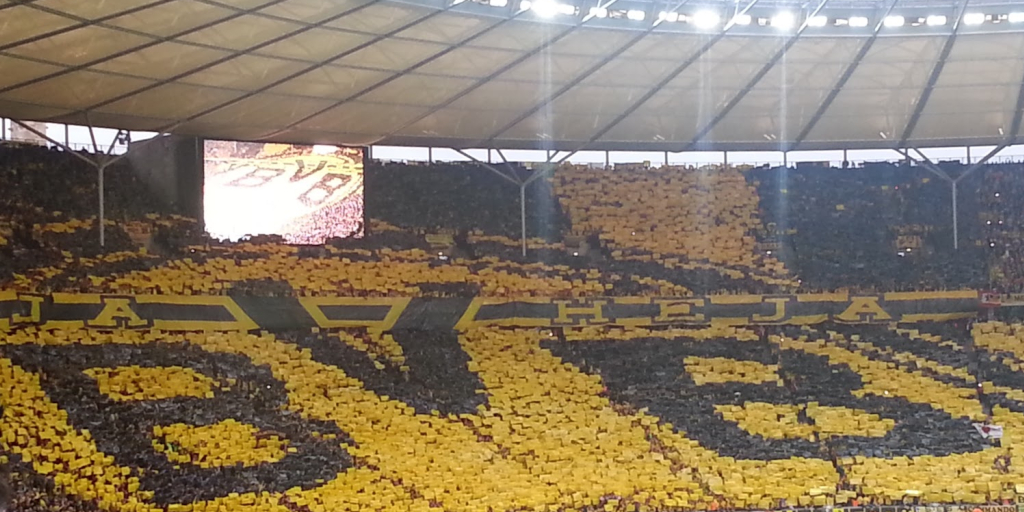Bundesliga prepares to confront its ghosts

When the players step out for the Revierderby between Borussia Dortmund and Schalke 04 this Saturday they will be doing so under the most extraordinary circumstances ever. There has never been a match between these two fierce rivals played behind closed doors. But for this match, along with the rest of the Bundesliga, and at least until the season ends in June, the sight and sound of a packed stadium seething with a passionate crowd will be replaced with empty seats and barren terraces. Until a vaccine for COVID - 19, Geisterspiele will be the new normal.
The so-called “ghost games” are part of the trade off for the resumption of football in Germany and as each country emerges from its Coronavirus lockdown what we see this weekend will be repeated with only a few variants in those other football nations.
Inside each stadium, social distancing has to be enforced on the sidelines and in the stadiums. Press access is significantly curtailed and there are personal restrictions placed on the players and their immediate family. As AP journalist James Ellingsworth, reports: “Not just players, but anyone who lives with them must minimize travel outside the home.”
Already one fixture has fallen victim to COVID-19. The Bundesliga 2 match between Dynamo Dresden and Hannover 96 has been postponed. Two Dresden players have tested positive for the disease and the entire squad has gone into isolation. The understandable fear is that as the season progresses, more players contract the virus and more games are rescheduled, putting back the end of the season.
Unsurprisingly, there is considerable opposition to the restart of the season. The reasons range from players' safety and restrictions on their personal freedoms, to the sheer lack of decency that the games should be played while the nation still hasn’t recovered from the crisis. While Germany has coped admirably compared to other northern European nations, over seven and a half thousand people have perished as a result of COVID-19, a number that will increase from the time I write this to the time you read it.
Even if you were to look past those issues, there is still the powerful view that that football is nothing without fans in the stadium and you would find few people with which to argue. However, football is also nothing without money and with a number of clubs, including Schalke 04 and Werder Bremen making it clear that if they are not back playing football soon they may not be back at all.
In the absence of the matchday experience, many fans will be doing what they’ve been doing for weeks during the crisis: helping the vulnerable and raising funds to help provide care for the sick. If you’ve followed the Bundesliga in the before time, you’ll know that the organised fanbases of all the clubs are incredibly engaged, socially and politically active. Their recent protests against what they perceive to be the commercialisation of the sport have caused offense and outrage. Some are the same fan groups helping their communities.
The majority fan ownership model in German football (the so-called 50+1 rule) remains the central point in many fan groups' view of how football should be run and they will go to great lengths to defend it. Without access to mainstream media, the action taken in the form of protests has been pretty extreme and for the most part focussed on billionaire and principal backer of TSG Hoffenheim, Dietmar Hopp who is the focal point of fan antagonism towards those that wish to end the current ownership structure.
For now at least, the protests that were so much a part of the narrative of the season prior to the lockdown have for the time being become a non issue, at least while there are no fans in the stadiums. No doubt DFL CEO Christian Seifert will be relieved that the banners of Dietmar Hopp in the crosshairs and off-colour statements about his parentage will remain furled while those who created them are barred from the stadium. Don’t be surprised to see cardboard cutouts of fans fixed to seats and crowd noises piped through the stadium's public address systems in an attempt to create an authentic atmosphere. Equally, don’t expect these cardboard fans to be calling Dietmar Hopp a son of a whore or chanting “Sheiss DFB”
However, the issues that form the foundation of the protests have not gone away. Far from it, as clubs now facing an uncertain future look at the 50+1 rule as a barrier to their financial recovery. The rule prevents clubs from being taken over by external investors, something that ailing clubs seek to attract. The possibility is that club executives, opposed to 50+1 could use the current crisis and absence of fans in the stadium to push through a change and allow new investment and an end to fan majority ownership.
For those of us who watch the Bundesliga from afar there should be plenty happening on the pitch to get excited about. Unusually, this close to the end of the Bundesliga season, the title race is still pretty open with Bayern Munich holding a three point lead ahead of second placed Borussia Dortmund and RB Leipzig and Borussia Mönchengladbach in third. At the bottom, historic giants Werder Bremen are going to need an heroic push to save themselves.
With no fans to influence play and with inadequate preparations for the players and coaches, we can anticipate some low quality football. This could mean opportunities for clubs that have managed the crisis better than others to seize the advantage as German football establishes its new normal. The Geisterspiele may prove to be a great leveller.


 Apple podcasts
Apple podcasts Google podcasts
Google podcasts Spotify
Spotify TuneIn
TuneIn RSS feed
RSS feed Instagram
Instagram Blue Sky
Blue Sky